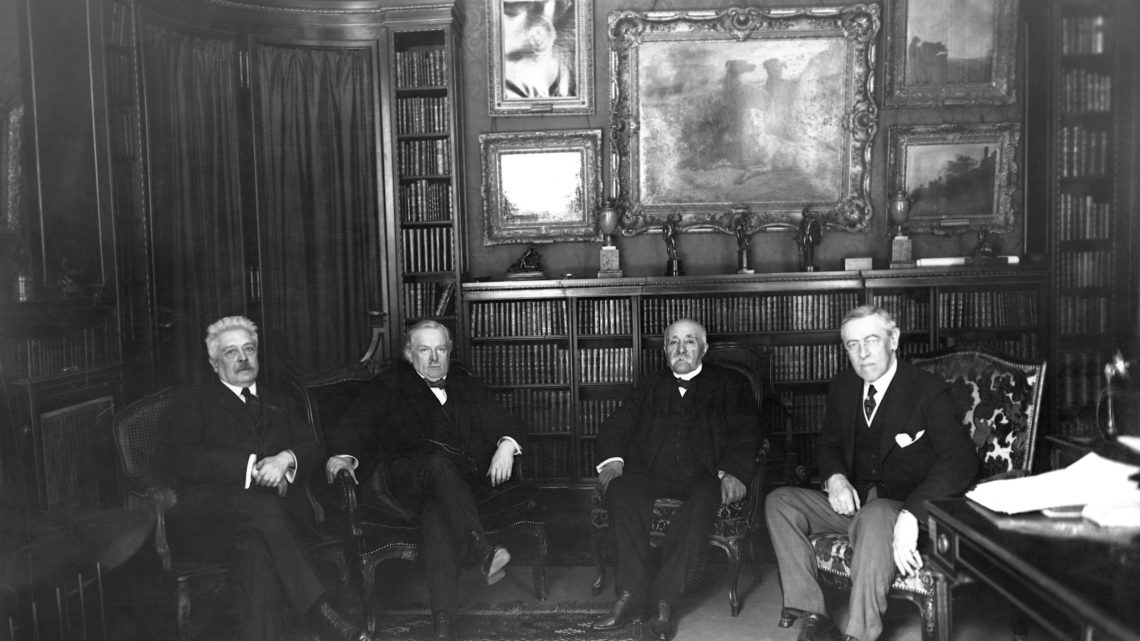Woodrow Wilson’s Case of the Flu, and How Pandemics Change History
On the evening of April 3, 1919, in Paris, President Woodrow Wilson began to cough; he soon took to bed, feverish and unable to move. He had contracted what had become known as the Spanish flu, the President’s physician wrote confidentially to the White House, and it had made Wilson “violently sick.” By then, the influenza had rampaged around the world for more than a year and was on its way to killing at least twenty million people, including at least six hundred thousand Americans. Wilson was in Paris for the treaty negotiations following the end of the First World War, which sought to shape the postwar global order and settle the status of the defeated Germany. He became ill at a decisive moment, making the virus an insidious actor in one of the twentieth century’s most consequential episodes of great-power diplomacy.
How does a pandemic alter history? To capture the scale of lives lost and economies shattered, and the national mobilizations often required, it has become common to compare the catastrophe to a war against an “invisible enemy.” This is the preferred metaphor of Donald Trump, a self-pronounced “wartime President,” and also of many other national leaders who are struggling forward in these days of covid-19. Yet, among other shortcomings, war metaphors fail to capture the natural and intimate character of a severe and contagious illness, and how its effect on individual behavior can often be subtle and difficult to measure.
In the days before Wilson was stricken, he had argued heatedly with the French Prime Minister, Georges Clemenceau, and the British Prime Minister, David Lloyd George, about the price, in territory and reparations, that Germany should be made to pay as the aggressor in the war. Wilson thought that the Allies should go easy on Germany’s nascent postwar republic and prioritize his idealistic, ahead-of-its-time project, the League of Nations, and the enlightened principles of self-determination among peoples which he promoted. But France had twice endured German occupation during the previous half century, and Clemenceau sought what the French public saw as a just and prudent resolution: tens of billions of dollars to rebuild France, plus buffer zones on the country’s eastern frontier, including the occupation by French troops of the German Rhineland.
By April, Wilson and Clemenceau had argued themselves into a mutually aggravating deadlock. When Clemenceau learned that Wilson was ill, he asked Lloyd George, “Do you know his doctor? Couldn’t you get round him and bribe him?”
Wilson, sequestered during his recovery in the Hôtel du Prince Murat, an elegant town house in the Eighth Arrondissement, soon appeared changed by his bout with flu. He became obsessed with “funny things,” as an aide put it. He grew fixated on the furniture in the house and came to believe that he was surrounded by French spies. “We could but surmise that something queer was happening in his mind,” Irwin Hoover, the President’s chief usher, said. “One thing is certain: he was never the same after this little spell of sickness.” Hoover’s remarks are recounted by the historian John Barry in “The Great Influenza,” his magnificent narrative of the pandemic of 1918 and 1919. Barry points out that Wilson’s reported disorientation can be a complication of severe influenza.
During the second week of April, an exhausted Wilson gave up most of the demands that he had been pressing Clemenceau to meet. The President accepted the demilitarization of the Rhineland and its occupation by France for at least fifteen years, along with an open-ended process for calculating Germany’s reparations bill. In the judgment of Margaret MacMillan, the author of “Paris 1919: Six Months That Changed the World,” an authoritative account of the postwar negotiations, Clemenceau suddenly found himself with “the best possible deal for France.” Infamously, the achievement was a Pyrrhic one. The Treaty of Versailles, signed on June 28, 1919, and which ratified Wilson’s concessions, proved to be a settlement so harsh and onerous to Germans that it became a provocative cause of revived German nationalism during the nineteen-twenties and thirties, and, eventually, a rallying cause of Adolf Hitler.
Barry considers in his book whether Wilson might have been a more forceful and stubborn negotiator in Paris if he hadn’t contracted the flu, and whether, therefore, the history of the twenties and thirties in Europe might have turned out differently. He is appropriately skeptical of such counterfactual speculations; we cannot know what might have happened if Wilson had remained healthy and vigorous, only “what did happen,” as he writes. “Influenza did strike Wilson. Influenza did weaken him physically. . . . precisely at the most crucial point of negotiations.” Nazism’s triumph over Germany was caused by much more than the blowback from the Versailles Treaty, yet there can be little doubt that the treaty’s punishing terms, including the highly visible French occupation of German territory, did help Hitler to mobilize and narrate German grievances. Lloyd George, who had opposed, in particular, the French occupation, later concluded in a memoir that the “odious accompaniments of such an occupation of German towns . . . had much to do with the fierce outbreak of patriotic sentiment in Germany, which finds its expression in Nazism.”
Wilson recovered from the influenza, but suffered a severe stroke six months later, and was incapacitated through the remainder of his Presidency. He should be remembered as a thoroughgoing failure as a pandemic-time President. In addition to the debacle of Versailles, he never once spoke publicly about the flu as it decimated the United States. He was so narrow-mindedly focussed on the American war mobilization that he generated “a kind of furious intolerance” for any other subject of governance, Barry told me, and he suppressed dissent in the United States in ways that “went beyond anything seen in the McCarthy period or any other time.” He added, “Much like Trump, he did not tolerate criticism from friend or foe. Even if a friend evidenced any distance from him, he exiled that person. All this makes Wilson’s complete silence on the pandemic understandable in only one context: he would do nothing to distract him or the nation from the war effort. His focus was absolute—there was the war, and nothing else.”
It was unfortunate that Wilson fell so ill in Paris; we can easily forgive his frailty in the run-up to Versailles, but not his record of prolonged indifference, before then, to public suffering at home among the citizens who elected him, or the racist convictions that led him to support institutionalized segregation. For now, it seems hard to judge which presents the greater record of Presidential failure during a pandemic: Wilson’s silence or Trump’s bombast, self-contradiction, and self-promotion. It may be partly just bad luck that the two worst pandemics to strike the United States in the past hundred years coincide with the terms of two Presidents so plainly unprepared for their responsibilities. Yet it bears reflection that, even a century ago, as is so obvious today, the country requires a President at least as knowledgeable about and committed to sound science and public health as to diplomacy and national defense.
A Guide to the Coronavirus
- How to practice social distancing, from responding to a sick housemate to the pros and cons of ordering food.
- How the coronavirus behaves inside of a patient.
- Can survivors help cure the disease and rescue the economy?
- The long crusade of Dr. Anthony Fauci, the infectious-disease expert pinned between Donald Trump and the American people.
- The success of Hong Kong and Singapore in stemming the spread holds lessons for how to contain it in the United States.
- The coronavirus is likely to spread for more than a year before a vaccine is widely available.
- With each new virus, we have scrambled for a new treatment. Can we prepare antivirals to combat the next global crisis?
- How pandemics have propelled public-health innovations, prefigured revolutions, and redrawn maps.
- What to read, watch, cook, and listen to under coronavirus quarantine.



No Comment